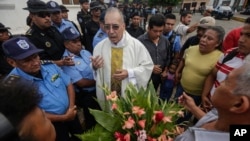Sixteen Nicaraguan opposition activists, including 13 social leaders who were arrested as they tried to deliver water to hunger strikers protesting the incarceration of relatives they say are political prisoners, were charged Monday with allegedly transporting weapons.
The charges, which carry a minimum sentence of five years in prison, are based on a police report saying authorities confiscated handguns, a shotgun and gasoline bombs.
Police presented the detainees before government media, handcuffed, wearing prison uniforms and guarded by masked officers. They smiled but did not speak in video images released by authorities.
Police also showed the weapons allegedly seized from those arrested.
Relatives, opposition leaders and journalists massed outside the court but were not allowed in to witness the proceedings.
The Organization of American States has expressed "concern and condemnation" of the arrests.
Among those arrested is Amaya Coppens, a Nicaraguan-Belgian dual citizen who was imprisoned for nearly a year for taking part in protests last year against the government of President Daniel Ortega.
Defense attorney Maria Oviedo said the judge on the case is the same one who found Coppens and numerous other protesters guilty of "terrorism" last year.
The 13 were detained Thursday in Masaya when they tried to reach the 11 women on hunger strike at the San Miguel church, where power and water had been cut off and which remains surrounded by police.
The women are mothers, wives and sisters of jailed government opponents and the protest aims to push for their release.
In a statement, police argued the arrested activists had intended to "continue carrying out terrorist acts ... against police buildings, city halls and monuments to heroes and martyrs" of Ortega's Sandinista movement.
Juan Sebastian Chamorro, leader of the opposition Civic Alliance, condemned the arrests and prosecutions, saying the government "makes up crimes and plants evidence" to incriminate its opponents.
His niece Margarita Hurtado is among the accused.
Also Monday, another group of seven family members of imprisoned government opponents began a hunger strike of their own at the cathedral in Managua, the capital, said Jose Luis Borge, a doctor who was accompanying the protesters and who was fired by the Health Ministry last year after he treated wounded student protesters. Police moved to surround the cathedral as well.
Opposition leaders say more than 138 protesters are behind bars for reasons they consider political, though about 700 were released earlier this year and Ortega's government has denied holding any prisoners of conscience.
The demonstrations that erupted in April 2018 demanded Ortega leave office and allow early elections, accusing him of authoritarian rule and consolidating power in his person and his family.
At least 328 people died in a crackdown by security forces and armed pro-government militias, according to the Inter-American Commission on Human Rights. Some 2,000 were wounded, and tens of thousands fled to exile.
Government officials have repeatedly called protesters coup plotters and terrorists, and Ortega has vowed to serve out his term.
The government has not commented on the charges against the activists or the hunger strikes, but first lady Rosario Murillo, who is also vice president, said in midday remarks that "the peace cannot be messed with."
"We are consolidating a culture of dignity, respect, nonviolence, solidarity, reconciliation and peace," Murillo said.




